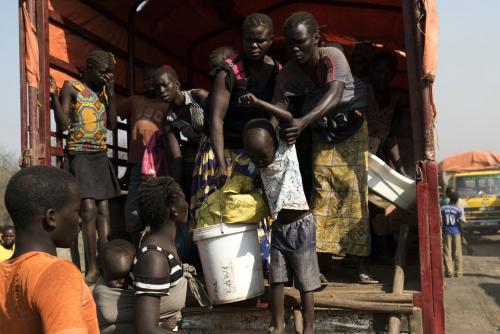South Sudan, Africa's largest refugee crisis, needs urgent response – UN agency
With already more than 3.5 million displaced within and outside the borders of South Sudan and thousands more driven to neighbouring countries every day, the United Nations refugee agency has appealed for an urgent peaceful resolution to what has now become Africa's worst refugee crisis.

South Sudanese refugees get off the truck at Palorinya settlements in Uganda where each family will be given a piece of land for shelter.
“Recent new arrivals report suffering inside South Sudan with intense fighting, kidnappings, rape, fears of armed groups and threats to life, as well as acute food shortage,” William Spindler, a spokesperson for the Office of the UN High Commissioner for Refugees (UNHCR) told the media at a regular briefing in Geneva.
“More than 60 per cent of the refugees are children, many arriving with alarming levels of malnutrition – enduring devastating impact of the brutalities of the ongoing conflict,” he added.
However the crisis, third only to the displacements in Syria and Afghanistan and now in its fourth year, has received less attention and is plagued by chronic levels of underfunding.
UNHCR said that its response capacities are overstretched in the countries hosting the refugees and the lack of funds is affecting critical and life-saving efforts such as providing clean, drinking water, food, health and sanitation.
Last month, the agency revised upwards its funding requirements for 2017 to $781.8 million (some $297.9 million or 61 per cent higher than the earlier budget) in light of new needs of those who have been displaced due to renewed fighting, increased violence and resulting food insecurity since July last year.
The agency's last year funding appeal of $649 million received only 33 per cent of the amount needed.
500,000 displaced in four months – more than 4,000 every day
The period between September and December 2016 saw almost half a million South Sudanese seeking refuge in neighbouring countries – an average of almost 4,100 people every day for four months.
According to Mr. Spindler, as the global displacement trends reflect, those fleeing South Sudan are being hosted by the poorest communities in the neighbouring countries, under immense pressure with scarce resources.
Noting that the welcome South Sudan refugees received in the neighbouring countries “is encouraging” he cautioned that the lack of resources to respond is also extremely worrying.
The majority of the refugees are being hosted by Uganda (about 698,000), followed by Ethiopia (about 342,000), Sudan (305,000), Kenya (89,000), the Democratic Republic of the Congo (68,000) and the Central African Republic (4,900).
“We are working with authorities in South Sudan's neighbouring countries to provide life-saving support and look after the basic needs of those arriving in desperate conditions,” the UNHCR spokesperson said, renewing a call on donor countries to step up support to the humanitarian efforts for the South Sudan situation.
South Sudan has faced ongoing challenges since a political face-off between President Salva Kiir and his then former Vice-President Riek Machar erupted into full blown conflict between forces loyal to each in December 2013. The crisis has produced one of the world's worst displacement situations with immense suffering for civilians.
Despite the August 2015 peace agreement that formally ended the war, conflict and instability have also spread to previously unaffected areas.
Source:United Nations
- 270 reads
Human Rights
Ringing FOWPAL’s Peace Bell for the World:Nobel Peace Prize Laureates’ Visions and Actions

Protecting the World’s Cultural Diversity for a Sustainable Future

The Peace Bell Resonates at the 27th Eurasian Economic Summit

Declaration of World Day of the Power of Hope Endorsed by People in 158 Nations

Puppet Show I International Friendship Day 2020

